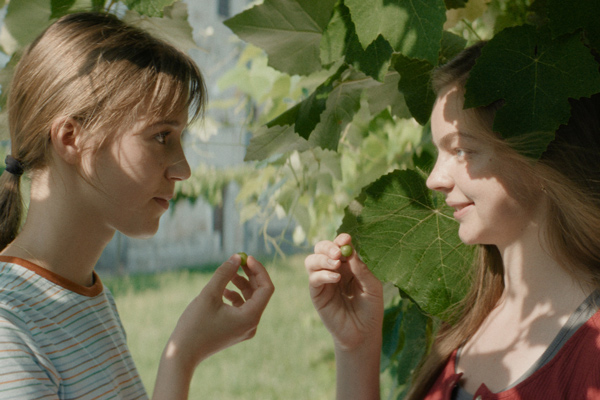Circles of Perfection: Djukić Surveys the Compromises of Sexual Awakening
 Taking its title from the 1995 Sonic Youth track Little Trouble Girls (Kaj ti je deklica), Slovenian director Urška Djukić’s narrative debut explores the familiar but astute sexual awakening of a young woman while navigating conflicting social reinforcements. As evidenced in her 2021 co-directed short “Granny’s Sexual Life,” based on Slovenian writer Milena Miklavcic’s publication Don’t Play with Fire, Ass and Snakes, which featured collected testimonials of women’s sexual experiences who were all in their eighties, Djukić is profoundly interested in capturing the tormented process of women’s sexual experiences, shaped by the restrictions imposed upon them by society, religion, and each other.
Taking its title from the 1995 Sonic Youth track Little Trouble Girls (Kaj ti je deklica), Slovenian director Urška Djukić’s narrative debut explores the familiar but astute sexual awakening of a young woman while navigating conflicting social reinforcements. As evidenced in her 2021 co-directed short “Granny’s Sexual Life,” based on Slovenian writer Milena Miklavcic’s publication Don’t Play with Fire, Ass and Snakes, which featured collected testimonials of women’s sexual experiences who were all in their eighties, Djukić is profoundly interested in capturing the tormented process of women’s sexual experiences, shaped by the restrictions imposed upon them by society, religion, and each other.
Lucia (Jara Sofija Ostan) is a demure and docile sixteen-year-old who has existed in the fiercely protected realm of her mother (Nastasa Burger). Having recently joined the all-girls choir at her Catholic school, she’s introduced to a senior student, the popular and worldly Ana-Maria (Mina Svajger). They bond over lipstick, which immediately rankles Lucia’s mother, who forbids makeup. On a weekend choir retreat to a countryside convent, Lucia and Ana-Maria find themselves enamored with a handsome restoration worker, who seems to return Lucia’s interested gaze. This heightens Lucia’s conflict with the other girls, who find her boring and virginal. But as Lucia begins to understand the budding attraction she’s beginning to feel, her inability to articulate these yearnings only seems to aggravate the peers and adults around her.

Djukić opens her film with a tapestry featuring an exaggerated labia, and later references historical anecdotes about a matriarchal culture’s embrace of the female form and biological attributes. The troupe of girls discussing this laugh about the archaic methods such women used during menstruation, which prompts the logical segue into sharing what age they were when they had their first period. Lucia, at sixteen, has yet to experience this, prompting another girl to suggest she’s not a woman until she’s traversed this right of passage. Clearly, this is cause for derision for some of the girls, like a low-key version of the trauma experienced by the titular heroine of Stephen King’s Carrie. But Lucia is comforted by Ana-Maria’s supportive stance, who seems intensely interested in shaping her less experienced mentee.
Lucia’s home life is depicted as a sterile wasteland, her mother awkwardly unable to confront her daughter’s sexuality. It’s clear Lucia’s body is a property not yet her own. A moment of bonding between mother and daughter while eating ice cream and watching a late night movie is awkwardly ruined when a sex scene prompts the channel to be changed, a hard won enjoyment ruined. But what could be safer than a road-trip with the Catholic school girls’ choir? Never mind that Lucia hardly seems interested in singing, but it appears to be the only extracurricular activity which allows her a modicum of access to the world.
Djukić explores a series of power plays enacted upon Lucia, who escapes the clutches of her domineering mother only to be thrown into conflict with the more experienced Ana-Maria, who is initially friendly and then perhaps jealous of the attention Lucia seems to receive from the construction worker they both find appealing. Likewise, their conductor (Sasa Tabakovic), who experiences unvocalized tensions with the girls. Ana-Maria taunts his enthusiasm at sighting a deer from the bus windows, the same perspective which will allow Lucia the view of a naked man sunbathing. Both the naked man and the deer are natural forms, but are juxtaposed as innocuous and dangerous. A moment of vulnerability between Lucia and the conductor seems to provide the opportunity for him to publicly humiliate her, which follows upon several girls hearing Lucia masturbate for the first time in the women’s restroom.
Visuals of flower blooms unfurling relate to Lucia’s self-discovery, but her environment actively works against her. In order for the male gaze of the restoration workers to be averted, extra curtains are hanged in the convent to shelter the girls as they ‘work,’ which leads Lucia and Ana-Maria to question one of the nuns on the difficulties of celibacy, and they eschew her perspective on learning how to channel the touch of God as a meaningful alternative to human touch. Perhaps, most meaningfully, Djukić leads Lucia to the fulfillment of touching herself, literally and figuratively. As Sonic Youth plays over the willowy visage of a partially awakened Lucia, it’s clear a formative experience has transpired. But as the lyrics of the titular song suggest, trouble lies ahead.
Reviewed on February 14th at the 2025 Berlin International Film Festival (75th edition) – Perspectives. 89 mins.
★★★/☆☆☆☆☆


